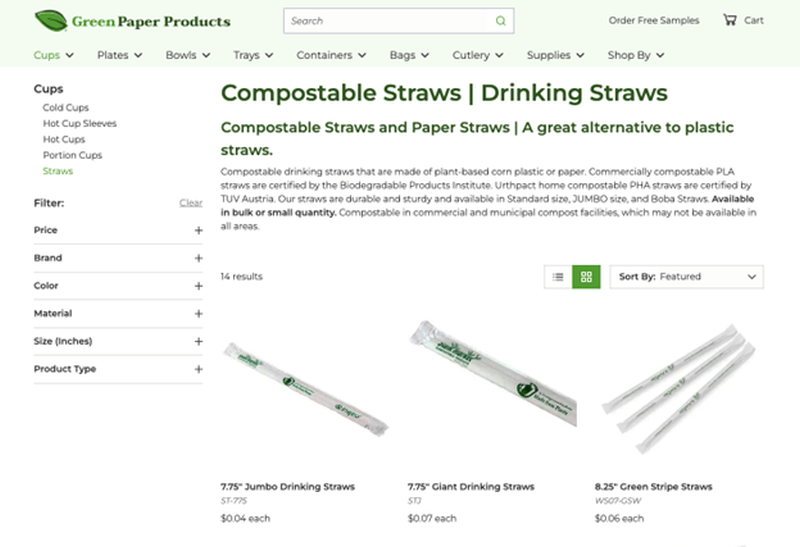If you have ever walked into a café and ordered an iced coffee, you’ve probably noticed it’s common to be served with a plastic straw. And if you are not the type to indulge in these kinds of drinks, chances are you have seen people sipping them with plastic straws. These plastic tubes are everywhere, especially in the restaurant industry, where millions of people use them daily. While they may seem convenient and harmless, plastic straws have significant environmental costs.
But who says you cannot enjoy your favorite beverage and still save the environment? You can do it with paper straws. Yes, the ones that sometimes get soggy if you sip too slowly. These tubes are becoming the new norm and this is not just a trend. Because they break down faster, are harmless to marine life, and are made from renewable resources, they represent a push toward a healthier planet.
There is a growing global movement to eliminate the use of plastic straws. Countries and cities are banning them, and businesses need to embrace this transition by promoting paper straws as a sustainable alternative.
The Environmental Benefits of Paper Straws

The materials used in producing plastic straws are not biodegradable and usually take decades to break down. They sit in landfills, clutter our oceans, and even when they eventually degrade, they just turn into tiny microplastics that continue to pollute the environment. However, with paper straws, decomposition takes only a few weeks, and they return to nature without leaving behind any harmful residue.
If you can imagine the billions of plastic straws that are used daily and tossed away, then you will understand the sheer volume of plastic waste that the environment will have to deal with for the duration it takes them to decompose. Then, there is the danger it poses to our oceans and marine life. For years, different species of sea animals, including turtles and fish, have been ingesting plastics and other marine debris, and this will continue if we do not stop using plastic waste.
Oftentimes, plastic debris may be mistaken for food; in some cases, it could be mixed with the animal’s natural food and ingested. Eating plastic is harmful to animals as it can lead to indigestion, loss of nutrition, internal injury, and sometimes death. We can cut down on plastic waste and reduce ocean pollution by switching to paper straws because they dissolve faster, disintegrate, and disappear, leaving the ocean a little cleaner and protecting the creatures that call them home.
Read More: Your Complete Guide to zero waste minimalist travel
Climate Benefits of Adopting Paper Straws
The Production of plastic straws particularly when sourced from sustainably managed forests, generally results in a lower carbon footprint compared to plastic. This is primarily because trees absorb carbon dioxide (CO2) during their growth, effectively offsetting some of the emissions produced during paper manufacturing. Moreover, paper production relies less on fossil fuels than plastic.
Now, when you consider the volume of plastic straws used globally, you will agree that even a small shift towards paper straws can potentially contribute to a reduction in greenhouse gas emissions. However, the role of sustainable forestry is critical in ensuring that paper straw production aligns with environmental goals by planting new trees to replace those harvested. This way, the forests can continue to act as carbon sinks, absorbing CO2 from the atmosphere.
Implementing Paper Straws in Your Restaurant

While the transition may require some adjustments, the long-term benefits outweigh the challenges. Below is a guide on how you can transition from plastic to paper straws:
- Phase out plastic straws gradually; you do not need to effect the change overnight. Begin by offering paper straws as an option, and then slowly reduce your plastic straw inventory.
- Train your staff to promote paper straws and explain why you are making the change. Ensure they are comfortable answering customer questions and addressing concerns.
- Establish relationships with reliable suppliers who can provide a consistent supply of high-quality paper straws at a reasonable price. You don’t want your business to suffer financially in the process.
Read More: 15 Essential eco-friendly features for your green luxury home
Handling Customer Expectations
This transition can be tricky as some customers might not be comfortable using paper straws, one way to go about this is to educate them on its environmental benefits. Engage in friendly conversations with customers who have questions. It’s like sharing a recipe, you want to explain why it is great and how it makes a difference. Encourage customer feedback, and let them share their thoughts and experiences with the paper straws. This information can help you refine your approach and make further improvements.
Furthermore, you must source high-quality paper straws as you switch. Not all paper straws are created equal, Opt for the ones made from sustainably sourced materials that are durable and do not easily become soggy. Ask for samples and test different brands to find the best fit for your drinks before you commit to a large order.
Beyond Straws: Other Sustainable Practices for Restaurants
The transition from plastic straws to paper straws is a great way to positively impact our environment without sacrificing comfort and convenience, but why stop there? There are several restaurant sustainability practices you can adopt:
- Reduce other single-use plastics. Swap out plastic utensils, cups, and takeout containers for biodegradable or reusable options.
- Encourage customers to come with their containers in case they have leftovers.
- Implement comprehensive waste management and recycling programs by setting up marked bins for recycling and composting.
- Train your staff on proper waste management and disposal.
- Partner with local composting facilities to ensure food waste is put to good use.
- Explore other eco-friendly products that complement paper straws. Use cloth napkins instead of paper ones, or offer bamboo cutlery.
- Choose environmentally friendly cleaning products.
Conclusion
Switching to paper straws offers significant environmental and climate benefits. They break down quickly, reducing plastic waste and ocean pollution. They have a lower carbon footprint and support sustainable forestry, contributing to a healthier planet.
Restaurant and food business owners should consider the long-term positive impact of this simple switch. consider the long-term impact of this simple switch. Paper straws not only align with eco-friendly practices but also show your customers that you care about the environment.
Small changes in business operations can lead to big results for our planet. By adopting paper straws, you’re not just making a business decision; you are making a commitment to sustainability and a brighter future. So, let’s sip our way to a cooler, cleaner planet, one paper straw at a time.
Article Submitted By Community Writer




